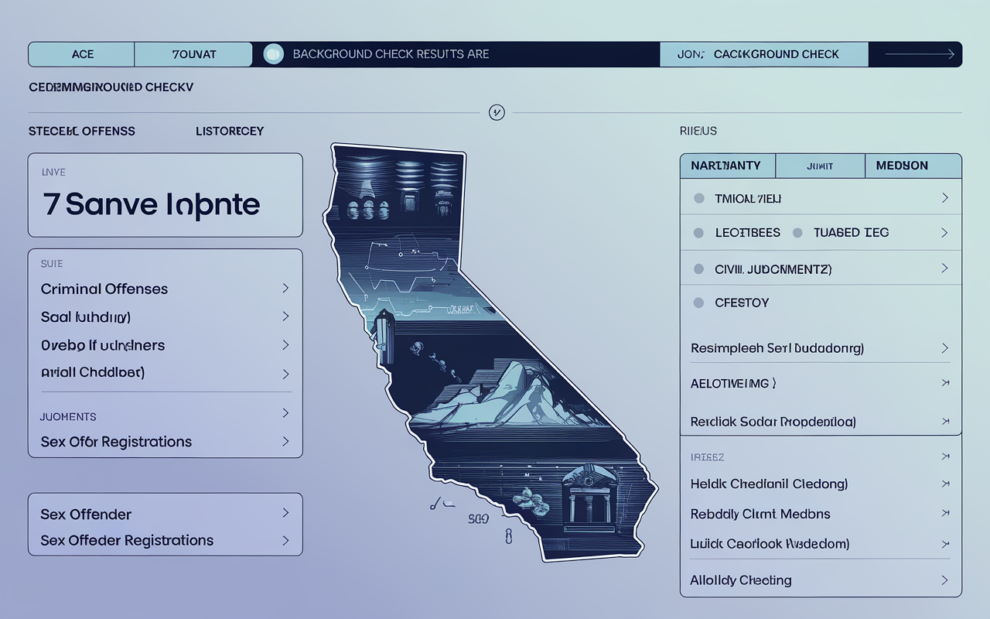Navigate the Future of Fair Hiring: Unlock Opportunities with 7-Year Background Check States in 2025!
Table of Contents
In 2025, background checks remain a cornerstone of decision-making for employers, landlords, and organizations evaluating candidates for jobs, housing, or other opportunities. However, the scope of these checks is shaped by federal and state regulations, notably the “7-year rule,” which limits how far back certain adverse information—such as criminal convictions, arrests, or financial records—can be reported. Several states impose stricter rules, capping the reporting of criminal convictions at seven years, a practice that promotes fairness by giving individuals a chance to move beyond past mistakes. This comprehensive guide defines the 7-year background check rule, identifies states enforcing it in 2025, explores its implications, exceptions, and compliance strategies, and answers common questions to help individuals, employers, and landlords navigate this evolving landscape.
What is the 7-Year Background Check Rule?
The 7-year background check rule is a regulatory restriction, primarily governed by the Fair Credit Reporting Act (FCRA) and supplemented by state laws, that limits the reporting of specific adverse information in consumer reports (e.g., background checks) to a seven-year period. Adverse information includes data that could negatively impact an individual’s eligibility for employment, housing, or other opportunities, such as arrests, civil judgments, or bankruptcies. The rule aims to balance the need for thorough screening with fairness, ensuring that outdated records do not indefinitely hinder opportunities.
Scope of the 7-Year Rule
- Non-conviction arrests: Arrests without convictions, measured from the date of arrest or charge. For example, an arrest in 2017 that led to no charges cannot be reported in 2025.
- Civil suits and judgments: Legal disputes or court-ordered payments, measured from the filing date or judgment date. A 2016 civil lawsuit settled in 2017 is no longer reportable.
- Paid tax liens: Settled tax debts, measured from the payment date. A tax lien paid in 2018 is excluded from 2025 reports.
- Collection accounts: Unpaid bills sent to collections, measured from the report date. A 2017 medical bill in collections cannot be reported.
- Chapter 13 bankruptcies: Measured from the filing date, unlike Chapter 7 bankruptcies, which have a 10-year reporting period.
For criminal convictions, the FCRA allows indefinite reporting unless state laws impose stricter limits. In “7-year states,” convictions are restricted to a 7-year lookback period, typically measured from:
- The disposition date (e.g., sentencing or plea).
- The release from incarceration.
- The start of parole or probation.
States with 7-Year Background Check Limits in 2025

As of 2025, several states enforce a 7-year limit on reporting criminal convictions, often with exceptions for specific roles or salary thresholds. These states align with or expand upon FCRA guidelines, creating a framework that varies by jurisdiction. Below is a detailed list of “7-year background check states” based on the latest data:
California:
- Law: California Civil Code Section 1786.18 and the Investigative Consumer Reporting Agencies Act limit conviction reporting to seven years from disposition, release, or parole, regardless of salary.
- Non-Convictions: Arrests without convictions are entirely prohibited from reporting, except for pending charges.
- Fair Chance Act: Employers must issue a conditional job offer before conducting a criminal background check, and only relevant convictions can be considered.
- Example: A 2017 felony conviction in California cannot be reported in 2025, even for a high-paying job.
Colorado:
- Law: Colorado Revised Statutes limit conviction reporting to seven years for jobs paying less than $75,000 annually.
- Non-Convictions: Follows FCRA’s 7-year rule for arrests and civil judgments.
- Exceptions: Higher-salary jobs or roles in sensitive industries (e.g., childcare) may allow longer lookbacks.
- Example: A 2016 conviction is excluded for a $50,000 job but reportable for a $80,000 position.
Kansas:
- Law: KSA 50-704 restricts conviction reporting to seven years for jobs paying under $20,000 annually.
- Non-Convictions: Aligns with FCRA guidelines.
- Exceptions: Convictions can be reported indefinitely for jobs paying $20,000 or more, a lower threshold than other states.
- Example: A 2015 conviction is not reportable for a $15,000 retail job but can be reported for a $25,000 managerial role.
Maryland:
- Law: Md. Code, Com. § 14-1203 limits conviction reporting to seven years for most positions.
- Non-Convictions: Follows FCRA’s 7-year rule.
- Exceptions: Higher-salary jobs or roles requiring security clearances may bypass the limit.
- Example: A 2017 misdemeanor conviction is excluded from a 2025 background check for a standard job.
Massachusetts:
- Law: Convictions older than seven years are not reportable unless the job pays over $75,000.
- Non-Convictions: Dismissed charges or non-convictions cannot be reported, except for pending cases.
- Fair Chance Rules: Employers must provide a copy of the background check and allow candidates to dispute inaccuracies.
- Example: A 2016 felony is excluded for a $60,000 job but reportable for an executive role.
Montana:
- Law: State regulations align with FCRA, limiting convictions to seven years for most jobs.
- Non-Convictions: Follows FCRA’s 7-year restrictions.
- Exceptions: Limited exemptions for sensitive roles like banking or law enforcement.
- Example: A 2017 conviction is not reportable in 2025 for a standard position.
Key Notes
- Jurisdiction Matters: The 7-year limit applies based on the applicant’s current residence or workplace, not the location of the record. For example, a California resident’s 10-year-old Texas conviction cannot be reported in California.
- Pending Charges: Most states allow reporting of pending charges, even in 7-year states, as they are not yet convictions.
- Verification: Employers and landlords rely on Consumer Reporting Agencies (CRAs) like CoreScreening to ensure compliance with state-specific rules.
Exceptions and Variations to the 7-Year Rule
The 7-year rule is not absolute, with variations and exceptions that affect its application:
Salary Thresholds:
Many 7-year states lift restrictions for higher-paying jobs, allowing indefinite reporting of convictions.
- Examples:
- Kansas: $20,000 threshold.
- New York: $25,000 threshold.
- Colorado, Massachusetts, Texas: $75,000 threshold.
- Impact: A 10-year-old conviction may be reported for a $100,000 job in Colorado but not for a $50,000 job.
- Rationale: Higher-salary roles often involve greater responsibility, justifying broader screening.
Industry-Specific Exemptions:
Certain industries require extended or indefinite background checks due to safety or regulatory concerns.
- Examples:
- Education: Schools may conduct 10-year or lifetime checks for teachers.
- Healthcare: Hospitals often require comprehensive checks for patient-facing roles.
- Financial Services: Banks may screen for fraud-related convictions indefinitely.
- Impact: A 7-year state may allow a 15-year-old conviction to be reported for a school principal position.
- Compliance: Employers must document the necessity of extended checks to comply with EEOC guidelines.
Clean Slate Laws:
These laws automatically seal or expunge eligible convictions or non-convictions after a set period, often aligning with the 7-year rule.
- Examples:
- Virginia: Effective October 1, 2025, certain misdemeanors and felonies are automatically sealed after 7 years.
- California: Non-violent felonies may be sealed after 7 years under clean slate provisions.
- Pennsylvania: Misdemeanors are sealed after 10 years, but 7-year reporting limits apply.
- Impact: Sealed records are generally not reportable, even if a state allows indefinite conviction reporting.
- Process: Individuals may need to verify sealing status or petition for manual expungement in some cases.
Non-Convictions:

Non-convictions (e.g., arrests without charges, dismissed cases) are often subject to stricter rules, sometimes prohibited entirely.
- Examples:
- California: Non-convictions are not reportable, regardless of age.
- New York: Only pending charges or convictions can be reported.
- Impact: A 2018 arrest with no conviction cannot appear in a 2025 report in California.
- Rationale: Non-convictions lack judicial findings, making their inclusion unfair.
Out-of-State Records:
Convictions from states without 7-year limits may be reportable in 7-year states if accessed directly (e.g., through court records).
- Example: A Texas employer may see a 10-year-old Florida conviction if Florida’s laws allow indefinite reporting.
- Compliance: CRAs must filter records to comply with the applicant’s current state’s laws.
Implications for Employers and Landlords
The 7-year rule shapes how background checks are conducted and used:
Compliance with Laws:
Employers and landlords must adhere to FCRA and state-specific 7-year rules to avoid legal penalties.
Details:
- Obtain written consent before conducting a check.
- Provide adverse action notices (pre-adverse and final) if rejecting a candidate based on a report.
- Use CRAs that filter records per state laws (e.g., excluding 8-year-old convictions in California).
- Example: A California landlord rejecting a tenant for a 2016 conviction risks a lawsuit for non-compliance.
- Penalty: FCRA violations can lead to fines up to $3,500 per incident or class-action lawsuits.
Fair Hiring and Housing Practices:
The EEOC and state fair chance laws encourage individualized assessments of criminal records.
Details:
- Consider the nature, gravity, and time since a conviction.
- Avoid blanket bans on applicants with criminal records to prevent discrimination.
- In housing, fair chance ordinances (e.g., Seattle) require conditional offers before criminal checks.
- Example: A New York employer must justify rejecting a candidate for a 2018 misdemeanor based on job relevance.
- Benefit: Promotes inclusivity and reduces disparate impact on protected groups.
Incomplete Information:
The 7-year rule may exclude older convictions, limiting the scope of a background check.
- Details:
- Employers may miss relevant information for roles requiring comprehensive checks.
- Landlords may rely on alternative methods (e.g., references) to assess tenants.
- Example: A 2015 felony may not appear in a Texas report for a $50,000 job, requiring additional vetting.
- Solution: Request extended checks where permitted or use industry-specific databases.
Administrative Burden:
Compliance with varying state laws increases complexity for multi-state employers or landlords.
Details:
- CRAs must customize reports by jurisdiction.
- Employers need policies for each state where they operate.
- Example: A national company must apply California’s 7-year rule for California applicants but Texas rules for Texas applicants.
- Solution: Use automated compliance tools or legal counsel to streamline processes.
Implications for Individuals
The 7-year rule offers protections and opportunities for individuals:
- Second Chances:
- Limiting the reporting of older records helps individuals reintegrate into society.
- Details:
- Improves access to jobs and housing for those with convictions older than seven years.
- Aligns with rehabilitation goals, as recidivism rates drop significantly after 7 years (per DOJ studies).
- Example: A 2017 conviction in California is not reportable in 2025, aiding job applications.
- Expungement and Sealing:
- Clean slate laws or manual expungement remove or hide records from background checks.
- Details:
- Virginia’s clean slate law (effective October 2025) seals certain felonies after 7 years.
- California allows automatic sealing of non-violent felonies after 7 years.
- Manual expungement petitions are available in most states for eligible records.
- Example: A sealed 2017 misdemeanor in Virginia won’t appear in a 2025 background check.
- Action: Verify sealing status with state courts or legal aid.
- Dispute Rights:
- The FCRA allows individuals to dispute inaccurate or outdated information in background checks.
- Details:
- CRAs must investigate disputes within 30 days.
- Errors, like reporting an 8-year-old conviction in a 7-year state, must be corrected.
- Example: An applicant can dispute a California report showing a 2016 conviction.
- Process: Contact the CRA in writing and provide supporting documentation.
- Privacy Protections:
- State data privacy laws (e.g., California’s CCPA) limit how personal information is used.
- Details:
- Applicants can request details on how their data is processed.
- Landlords and employers must secure consent for checks.
- Example: A California tenant can challenge a landlord’s misuse of their Social Security number.
Strategies for Compliance in 2025

Navigating the 7-year rule requires proactive measures for all parties:
- Partner with Reputable CRAs:
- Use screening providers that ensure compliance with FCRA and state laws.
- Details:
- CRAs like CoreScreening or iprospectcheck filter records based on jurisdiction.
- Ensure reports exclude non-reportable data (e.g., 8-year-old convictions in California).
- Example: A Texas employer uses a CRA to exclude a 2016 conviction for a $50,000 job.
- Stay Informed on Local Laws:
- Monitor evolving state regulations, including clean slate laws and salary thresholds.
- Details:
- Virginia’s clean slate law (October 2025) adds new sealing provisions.
- Consult legal counsel for multi-state operations.
- Example: A California landlord updates policies to comply with fair chance housing laws.
- Obtain Consent and Notify:
- Follow FCRA requirements for consent and adverse action notifications.
- Details:
- Provide clear disclosure and obtain written permission before checks.
- Issue pre-adverse and final adverse action notices if rejecting a candidate.
- Example: A New York employer sends a pre-adverse notice citing a reportable 2020 conviction.
- Review Your Record:
- Individuals should check their criminal and credit records for accuracy.
- Details:
- Use AnnualCreditReport.com for credit checks.
- Access state court records or CRAs for criminal history.
- Correct errors via disputes or expungement petitions.
- Example: An applicant corrects a misreported 2016 conviction before applying.
- Leverage Clean Slate Laws:
- Use automatic sealing or expungement to reduce record visibility.
- Details:
- Check eligibility in states like Virginia or California.
- Seek legal aid for manual expungement if automatic sealing isn’t available.
- Example: A Virginia resident verifies a 2017 felony is sealed in 2025.
FAQs
1. Which states enforce the 7-year background check rule for convictions in 2025?
California, Colorado, Kansas, Maryland, Massachusetts, Montana, New Hampshire, New Mexico, New York, Texas, and Washington limit conviction reporting to seven years, with exceptions for high-salary jobs or sensitive industries like healthcare.
2. Does the 7-year rule apply to all types of background checks?
No, the FCRA’s 7-year rule covers non-convictions (e.g., arrests, civil suits) for jobs paying under $75,000. Convictions can be reported indefinitely unless restricted by state laws in the listed 7-year states.
3. Can employers access older convictions in 7-year states?
Yes, in states like Kansas ($20,000 threshold), New York ($25,000), or Colorado ($75,000), convictions older than seven years can be reported for higher-salary jobs. Sensitive roles (e.g., education) may also allow extended checks.
4. How can individuals protect themselves from unfair background checks?
Review your criminal and credit records for accuracy, dispute errors with CRAs, and explore expungement or sealing options in clean slate states like Virginia (effective October 2025) or California.
Conclusion
In 2025, the 7-year background check rule remains a vital framework for balancing thorough screening with fairness, particularly in states like California, New York, and Texas. By limiting the reporting of convictions and non-convictions to seven years, these states provide second chances for individuals while challenging employers and landlords to comply with complex regulations. Understanding state-specific rules, exceptions, and clean slate laws is crucial for navigating this landscape. Whether you’re an employer ensuring compliance, a landlord adhering to fair housing laws, or an individual seeking opportunities, staying informed and proactive—through reputable CRAs, record reviews, and legal resources—ensures success in the dynamic world of background checks in 2025.
Do Follow Dragcast on Social Media For More Such Content.






Add Comment